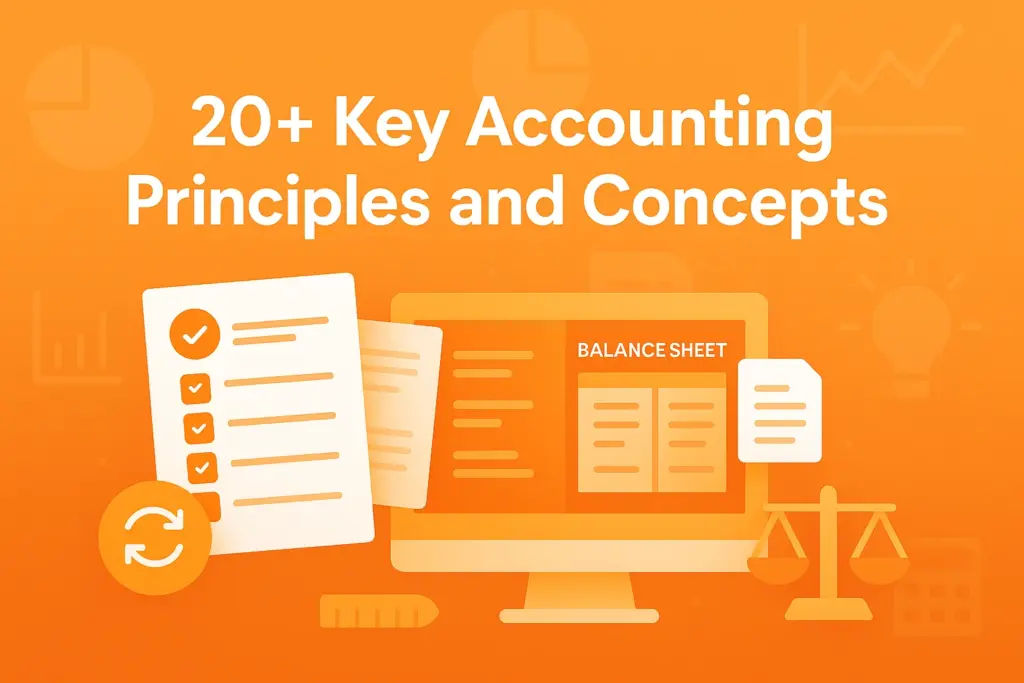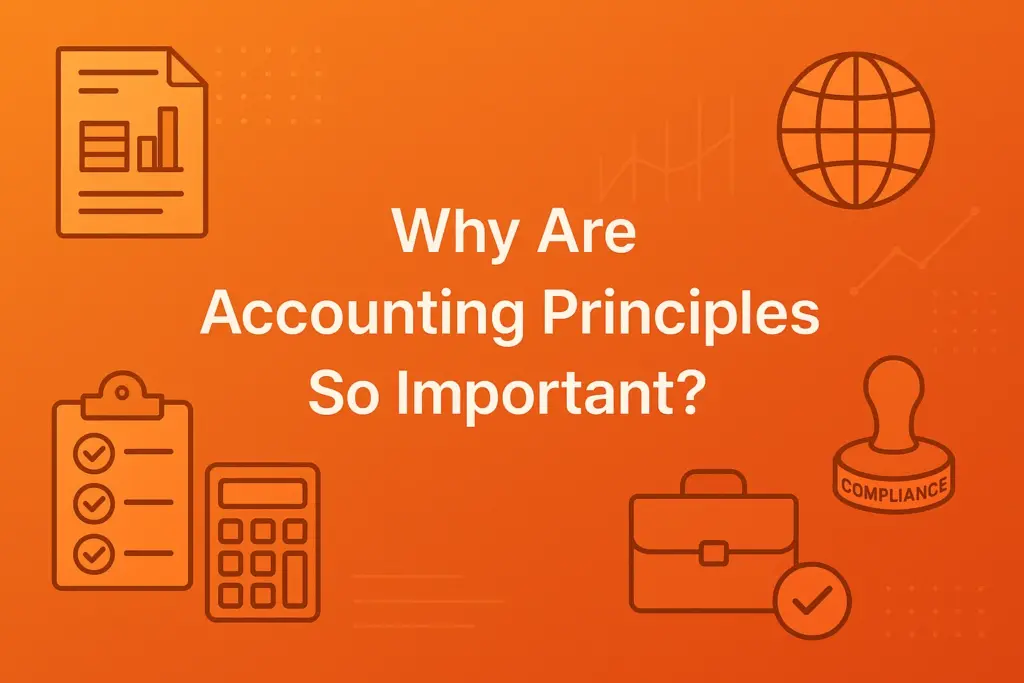Let’s face it — understanding accounting principles might not sound exciting at first, but if you’re running a business or planning to get into finance, it’s something you can’t ignore. These basic rules aren’t just textbook theories — they’re what keep your financial records clear, accurate, and, well legit. Whether you’re a student trying to wrap your head around balance sheets, or an entrepreneur figuring out where your money’s going, knowing the fundamentals can really change the game.
Every single part of accounting — from writing down transactions to building full financial reports — depends on these principles. And guess what? Most of what we call “modern accounting,” like GAAP, is built on them. In this post, we’ll walk through what these principles actually mean, why they matter in the real world, and how they affect the way we do business today. Sounds good? Let’s get into it.
What Are Accounting Principles?
Accounting principles are the standard rules and guidelines used to record, report and interpret financial data in a consistent and reliable way. But they are not just dry rules – they are the backbone of all successful financial systems! These principles ensure that your balance speaks the same language across industries, countries and businesses. They are developed by reliable global bodies such as FASB and IASB, and help to bring clarity, openness and trust in financial reporting. Whether you are a small business owner, accountant or investor, understanding these principles is the key to making smart, confident decisions in today’s fast -paced financial world.

20+ Key Accounting Principles and Concepts
Accounting Principles That Actually Make Sense. Let’s be real: accounting gets a bad rap. People think it’s boring, full of numbers, and overly complex. But the truth? It’s just a structured way to tell your business’s story in numbers. And once you understand the rules of the game, everything becomes a whole lot clearer.
Here are the accounting principles that keep your books honest, clean, and decision-ready.
1. Consistency Is Key
Imagine trying to watch a movie that keeps switching genres every 10 minutes. Confusing, right? That’s exactly what happens if a business randomly changes its accounting methods.
The Consistency Principle is all about sticking to one method — say, using straight-line depreciation — so that year-over-year comparisons actually make sense. If you do need to change your approach? No problem. Just document it clearly so others aren’t left guessing.
2. Materiality – Don’t Sweat the Small Stuff
Every business buys stuff like paper clips, pens, or staplers. Technically, these could be treated as assets. But let’s be honest — no one wants to track a ₹200 stapler as a fixed asset on a ₹50 crore balance sheet.
The Materiality Principle simply says: focus on what matters. Ignore the micro stuff that won’t move the needle.
3. The Cost Principle (a.k.a. Stick to What You Paid)
Ever looked at the current value of your land and felt like a millionaire? Cool — but your books don’t care.
According to the Cost Principle, you record assets at the price you paid when you bought them, not what they’re worth today. That land you bought for ₹10 lakhs in 2015? Still goes in as ₹10 lakhs, even if it’s worth double today. It keeps things objective and tamper-proof.
4. Full Disclosure – No Secrets, Please
If there’s something going on in your business that could affect how people view your finances — like a pending lawsuit or a massive contract you’re about to sign — you’re expected to tell the whole story.
That’s the Full Disclosure Principle. It’s not about airing dirty laundry; it’s about building trust.
5. Going Concern – Planning Like You’re Here to Stay
Businesses aren’t supposed to plan like they’ll shut down next week — unless they actually are. The Going Concern principle assumes your company will keep running in the foreseeable future.
Why does that matter? Because it affects how you spread out expenses. If you buy a ₹5 lakh machine today, you don’t expense it all at once — you spread the cost across, say, 10 years, because you plan to be around that long.
6. Matching Principle – Revenue and Expenses Go Hand in Hand
Here’s something logical: if an expense helps you earn revenue, they should show up in the same time period. That’s the Matching Principle.
Let’s say you ran a successful ad campaign in January that brought in ₹5 lakhs, but your agency sent the bill in February. Even if the payment happened later, the expense is still recorded in January — where the income happened.
7. Economic Entity Principle – Keep Business and Personal Separate
This one’s straightforward — don’t mix your personal wallet with your business bank account.
Even if you’re a one-person startup or a freelancer, the Economic Entity Principle says your business should be treated as its own separate identity. Buying groceries? That’s your expense, not the business’s. Clean books = clear decisions.
8. Conservatism – Hope for the Best, Prepare for the Worst
If there’s one thing accountants hate, it’s sugarcoating numbers. The Conservatism Principle says when you’re uncertain, it’s better to report potential losses than imaginary gains.
So if there’s a chance a client won’t pay that ₹50,000 invoice, don’t wait for it to become official — record it as a possible bad debt now. It’s about being realistic, not pessimistic.
9. Accrual Principle – Don’t Wait for the Cash
In real business, money often shows up late. That’s where the Accrual Principle comes in — it says record transactions when they happen, not when cash arrives.
You completed a service in March, but the client pays in April? You still show the income in March, because that’s when you earned it.
10. Monetary Unit Principle – If You Can’t Price It, Don’t Record It
Businesses are full of intangible things — like team spirit, customer loyalty, or a cool office vibe. But unless you can put a price tag on them, they don’t go into your financial records.
That’s the Monetary Unit Principle. Only record stuff you can measure in actual money. Warm feelings don’t belong on a balance sheet.
11. Revenue Recognition – Earn First, Then Record
A lot of people confuse receiving money with earning it. But in accounting, you only record revenue when the work is done — even if the cash hasn’t hit your account yet.
Let’s say you deliver an order on June 28, but the client pays you on July 10. The income still belongs in June’s books, because that’s when you fulfilled the obligation.
12. Time Period Principle – Keep It Consistent
Every business needs a rhythm — monthly, quarterly, yearly — whatever fits your model. That’s what the Time Period Principle is all about: breaking your financial data into clear, consistent intervals.
Even if you work on multi-year projects, your financial statements should still report results over regular time frames. It keeps everything comparable and trackable.
13. Objectivity Principle – No Guesswork Allowed
If you’re claiming something in your books, you better have proof. The Objectivity Principle insists on verifiable evidence — invoices, receipts, contracts, you name it.
No room for estimates or gut feelings here. If you want to claim a trip as a business expense, show the train ticket or hotel invoice — not just “trust me, bro.”
14. Prudence Concept – Don’t Count Your Chickens Too Soon
This one’s all about playing it safe. The Prudence Concept says: don’t overstate profits or understate costs just to make the numbers look good.
So if you’ve made a risky investment and you’re not sure how it’ll turn out, don’t report potential profits — but do consider any possible losses. It’s a “better safe than sorry” mindset in financial form.
15. Comparability – Make Apples-to-Apples Comparisons
Ever tried comparing two things that use completely different methods? Yeah, it’s messy. That’s why Comparability matters in accounting — it makes sure your financial data stays consistent across time and across companies.
If you do make a change in your accounting policy this year, no worries — just disclose it, and explain how it affects previous results so users can still draw meaningful comparisons.
16. Relevance – Keep It Useful
Not all accurate data is useful. That’s what Relevance addresses: only include information that helps someone make a decision.
So while recording a ₹10 pen refill may be technically correct, it doesn’t really matter in your annual report. Don’t clutter your finances with info no one will use.
17. Reliability – Trust What’s on the Page
Your financial records need to be more than just neat — they need to be reliable. That means backed by documentation and free from bias or wild assumptions.
If you say something costs ₹20,000, there should be a purchase invoice, or contract to support it. Without proof, the numbers lose credibility.
18. Understandability – Speak Human, Not Robot
Even if your finances are technically correct, they’re useless if no one understands them. The Understandability principle says reports should be clear and accessible — even to people who aren’t accounting pros.
That means using everyday language, clean layouts, and explaining terms when necessary. Clarity builds confidence.
19. Faithful Representation – No Sugarcoating
Numbers should reflect the reality of your business — nothing more, nothing less. Faithful Representation is about being complete, neutral, and error-free.
If your company had a rough quarter, say it. If a big deal fell through, include it. Don’t dress up the numbers to make things look better than they are.
20. Dual Aspect Principle – Every Action Has Two Reactions
The backbone of double-entry accounting, the Dual Aspect Principle reminds us that every transaction affects two accounts — always.
If you take a ₹1 lakh loan from a bank, your cash (asset) goes up, and so does your loan payable (liability). This keeps the fundamental equation in balance:
Assets = Liabilities + Equity

Why Are Accounting Principles So Important?
Accounting principles aren’t just formalities. They exist for real, practical reasons—and they shape how businesses stay accountable, honest, and clear with their numbers. Here’s what makes them so essential:
1) Set by Real Experts, Not Random Committees
- These rules come from authoritative bodies like:
- FASB (Financial Accounting Standards Board) in the U.S.
- IASB (International Accounting Standards Board) internationally
- They’re not based on guesswork—these organizations have decades of experience shaping financial standards.
2) Built on Both Theory and Experience
- Accounting principles reflect what works in the real world.
- They’re shaped by practical lessons from finance professionals and backed by academic research.
- It’s not just theory or just trial-and-error—it’s both.
3) Used Worldwide Through GAAP and IFRS
- These principles form the foundation of two major frameworks:
- GAAP – used mainly in the U.S.
- IFRS – adopted by many other countries
- This creates a common ground so companies across borders can report in a way that investors understand.
4) Updated Regularly to Stay Relevant
- Finance isn’t static, and neither are these principles.
- Standard-setters (like FASB/IASB) regularly revise the rules.
- New industries, technologies, and financial tools lead to new updates.
5) Make Financial Statements Clear and Comparable
- Imagine every company using its own rules—what a mess.
- These principles ensure:
- Consistency in how reports are prepared
- Comparability between different businesses
- Transparency that builds trust with readers and investors
6) Help People Make Better Business Decisions
- At the core, accounting principles aim to make financial information useful.
- Investors, lenders, and even small business owners rely on these reports to:
- Understand a company’s position
- Evaluate its performance
- Make informed financial decisions

Purpose of Accounting Principles
Accounting principles aren’t just there to follow — they serve a real purpose in making your business run smoothly, legally, and transparently. Whether you’re managing a small business or steering a global corporation, these principles help ensure your finances make sense to everyone involved.
1. Creating Consistency Across the Board
When companies follow the same accounting guidelines, it’s much easier to compare financial data — even across industries or countries. Think of it as everyone speaking the same financial language.
- Instead of making up their own way to report earnings or expenses, businesses stick to one system. This makes reports clearer, easier to read, and more trustworthy.
- Real-world example: An investor reviewing two company reports — one in India, the other in the US — can make a fair comparison if both follow GAAP or IFRS rules.
2. Ensuring Accuracy and Honesty
You can’t run a business on guesses. Accounting principles provide a clear framework for recording transactions accurately — no shortcuts, no confusion.
- This isn’t just about being precise; it’s about being honest.
- Errors, whether intentional or accidental, are easier to catch when you follow a solid accounting process.
- Example: If an external auditor reviews your books, having proper records makes their job — and your life — much easier.
3. Building Trust Through Transparency
The moment your numbers are transparent, people start to trust them. Investors, lenders, and even your team want to know that your financials are solid — and not just dressed up to look good.
- With accurate reports, banks feel more confident lending, and investors feel safer funding your next round.
- Example: A lender looking at your financials sees clean, detailed statements — and approves your business loan without hesitation.
4. Staying Compliant with the Law
Laws and regulations around accounting aren’t optional — and accounting principles help you stay on the right side of them.
- When your books are up to standard, it reduces the chance of penalties, fines, or tax issues.
- Example: Filing taxes using accepted accounting methods helps avoid errors that could flag an audit or invite legal trouble.
5. Helping You Grow Smarter
Accounting isn’t just about tracking the past — it’s about making better decisions for the future.
- When your financial data is clean and organized, it’s much easier to plan ahead — whether you’re budgeting, hiring, or pitching to investors.
- Example: A startup with clear, principle-based reports is more likely to impress venture capitalists and secure funding.
Limitations of Accounting Principles
While accounting principles are essential for keeping financial records clean and consistent, they’re not without flaws. These rules help us make sense of numbers, but they don’t always tell the full story of a business. Let’s walk through some of their common shortcomings — explained in a way that makes sense, even if you’re not an accountant.
1. Outdated Values: The Historical Cost Problem
Most assets in accounting are recorded at the price paid when they were bought. That may have made sense at the time — but over the years, values change. What you paid years ago might be far from what something is worth today.
For example: Suppose a company bought a property for ₹50 lakhs a decade ago. Its current market value might be ₹1.5 crores, but the books still show the old price. That gap can lead to misleading financial pictures.
2. What You Can’t Measure Gets Ignored
Accounting is all about numbers — but not everything valuable can be measured in rupees or dollars. Think of brand image, customer loyalty, or employee happiness. These things can shape a company’s success but rarely appear in financial statements.
Reality check: A company with great people and strong brand recognition may be doing incredibly well, even if its books don’t reflect it.
3. It’s Not All Exact: Estimates Play a Big Role
Despite its structured appearance, accounting often leans on guesswork. Many figures — like depreciation, provisions, or potential bad debts — rely on assumptions. Two accountants might handle the same situation differently.
The downside? Too much reliance on judgment leaves room for errors — or even intentional manipulation.
4. It Only Shows the Past
Financial reports are like history books. They focus on what has already happened, not what might happen next. For fast-changing industries, this backward focus can be limiting.
Think about it: Would you feel comfortable planning your future by only looking at yesterday?
5. Rules Can Be Bent
Even though accounting has rules, many of them allow flexibility. That sounds good — until someone uses that flexibility to stretch the truth. Businesses can tweak figures to appear more profitable or stable than they really are.
The danger: Clean-looking financials might be hiding deeper issues.
6. Not the Full Picture
While accounting gives us facts and figures, it doesn’t paint the whole business landscape. Key factors — like market shifts, environmental impact, or innovation — are left out.
In short: You see the numbers, but not always the story behind them.
7. Comparing Companies Isn’t Always Straightforward
Even companies in the same industry might use different accounting methods. These variations — like how inventory is valued or how assets are depreciated — can lead to major differences in financial results.
Example: One firm might use FIFO, another uses LIFO. That alone can make their profits look drastically different, even if their operations are similar.
8. No Global Standard That Everyone Follows
Although there are frameworks like GAAP and IFRS, not all countries or companies stick to the same rulebook. This makes things tricky for multinational businesses and investors.
The result: A financial report that’s fine in one country might not meet the standards somewhere else — creating confusion and compliance challenges.
Conclusion
Let’s face it — numbers don’t mean much without the rules that give them context. That’s what accounting principles are for. They’re the basic ideas behind how businesses keep track of money — how they report it, organize it, and make sure it actually reflects reality.
Say you’re running a small shop or looking over a company’s finances. Without a consistent set of principles, one business might record things totally differently from another. That would be confusing. These rules — things like consistency, cost, or full disclosure — are what keep everything aligned, no matter the industry or size of the business.
And look, in today’s world, where even small errors can raise big red flags, knowing these principles isn’t just for accountants. It’s useful for founders, managers, investors — really anyone making decisions based on money.
The bottom line? These principles help you stay honest, stay clear, and stay smart about your financial choices. No fluff — just solid ground to stand on when it counts.
Master the rules. Elevate your numbers. And build a business that speaks the universal language of financial truth.
Power Your Accounting with InvoPilot – Where GAAP Meets Automation!
Struggling to keep up with all those accounting principles? Let InvoPilot.com do the heavy lifting for you!
- Create 100% tax invoices in seconds
- Stay effortlessly GAAP-compliant – no more guesswork
- Automate revenue recognition and generate clean, audit-ready financial reports
- Built for freelancers, SMBs, startups – simple, smart, and scalable
- Secure, fast, and cloud-based – work from anywhere with confidence
Bonus: Don’t miss our Free Invoice Generator – lightning-fast, zero-hassle, and always free!
Whether you’re a finance pro or just starting out, InvoPilot helps you follow every accounting rule, without breaking a sweat. Master your books. Impress your investors. Grow your business.Try it now at InvoPilot – Your smarter way to manage money, the GAAP-approved way!
Create Invoices Instantly – Free & Easy!
Generate professional invoices in seconds with our Free Online Invoice Generator.
👉 Invoice Generator

Leave a Reply